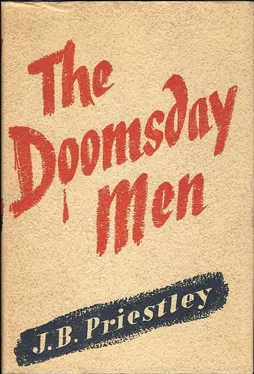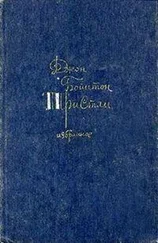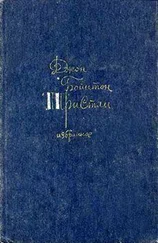On this October evening, however, there was only one guest in the dining-room of the Harvey House. Over in the lunch room, where you eat at the circular counter, there were plenty of customers, chiefly railroad workers, washing down slabs of pie with hot coffee. But the bright lights in the astonishing floral candelabra of the dining-room shone extravagantly in this desert only to illuminate one guest and a solitary waitress. The guest was dubiously examining one of those hard lumps of lettuce decorated with bits of pineapple and grapefruit and cheese and smeared all over with a thick pink paste, which are considered by all American caterers to be salads. The waitress, a severely virtuous young woman in spite of her musical comedy uniform and musical comedy make-up, was examining the guest. He was a very handsome young man and was wearing a brown tweed coat, a pretty blue shirt and tie, and neat grey flannel trousers. His hair was fair and rather wavy; he was nicely tanned; he had a charming shy smile and an English accent; and the waitress, who noticed all these things and fifty more, hoped that he was one of those young Englishmen who were now finding their way to Hollywood. Here she was both right and wrong, for the young man, Malcolm Darbyshire, had just come from Hollywood, but he was no film actor but an architect, who had been fortunate enough to wangle the job of conferring with an impatient client of his firm who wanted to build a house near the English studios. And Malcolm, pulling every possible string, had not wangled the job simply because he liked the idea of a nice long trip from London to Los Angeles (though he did not despise it), but because for the last six months he had found himself a dreamy, a haunted, a lunatic young architect, desperately in love with a mysterious girl, a sad sleeping beauty of a girl, a bewitched princess of a girl, with whom he had played tennis and exchanged a kiss. And he was here, poking at a fantastic salad, in Barstow, when he ought to have been returning home, because he had been told that Andrea MacMichael might possibly be found somewhere in this desolate region.
The waitress did not know all this, of course, but perhaps some mysterious intuition of the handsome young man’s state of mind, at once idiotic and wonderful, reached her, so that there was a certain sympathetic tenderness in the way in which she now placed before him two dishes of vegetables and a plate of lamb chops. She was rewarded with another charming smile, though it seemed a trifle absent-minded. And well it might be, for Malcolm found himself now, after six months’ haunted lunacy, living in a fantastic dream. He could not come to any sort of sensible terms with this vast continent, with its dusty plains and great mountains and hundreds of enormous rivers, its immense darknesses and sudden glare and glitter, its railway trains like small towns on the move, its incomprehensible mixture of cruelty and kindness, cleverness and stupidity, daring and cowardice, its equally mysterious politics, jokes, drinks, salads: and the whole monstrous thing had been crammed down his throat with one colossal shove. And now here he was, at the end of a dusty day, miles from anywhere that made any sense at all, in the middle of a desert that looked like a scrubby Sahara, looking for a girl who probably never wanted to set eyes on him again. He was, he knew, behaving like a complete and hopeless chump, unfit to be a member-and only a recent young member too-of the Royal Institute of British Architects. Yet he could not help feeling that he was also a glorious chump. He could not be certain if Andrea was really in this part of the world at all, yet already these barren hills, the roads he had seen running out to nowhere, this little town, were invested with glamour, as if they existed in a fairy-tale world. Before coming in to dinner, he had stood on the bridge, stretching its white length over a river that wasn’t there, and had stared at a sunset, immense, fiery, startling, that had ended the day as if it had been an epic; and though it was all so remote and strange, and at last the mountains had turned black and were like a savage silhouette against the pale-green receding sky, and the very first stars seemed to tell him he was in another world, he had been oddly comforted in his folly. Anything, it seemed, might happen here, even the reappearance of Andrea, and possibly an Andrea he could understand.
Malcolm looked up from his lamb chops, which were not so tender as the waitress had been, to observe that that young woman was now pouring ice-water into the glass of another guest, who was accepting that solemn ritual, which almost appeared to be the new American substitute for grace, with the grave calm of a fellow-citizen. He had seen this chap once or twice before: a tall untidy chap with shocking clothes flapping about him, but a pleasant, thoughtful-looking fellow, perhaps a year or two older than himself. They had, in fact, exchanged a nod and a word. Malcolm wished now he had suggested that they shared a table, for this American, though he was not dressed in the semi-cowboy rig of these parts, might know the district and the people in it. So far Malcolm had not asked anybody about the MacMichaels. He had only arrived from the Coast that afternoon, and he shrank from enquiring about his beloved at the hotel desk. Obviously Andrea and her millionaire father didn’t live here in this little town, and now Malcolm could not imagine where on earth they could live. The large map hanging in the little entrance hall had been anything but a comfort, for it simply showed him hundreds of miles of desert, sprinkled with grim names like Granite Wells, Dry Silver Lake, Devil's Playground, Death Valley . Talk about a needle in a haystack! This was like looking for one wisp of hay in twenty thousand mountainous acres of needles.
As Malcolm lit a cigarette and wondered how to open a conversation with the tall young man in the other corner, another man arrived. But this newcomer waved away the waitress, and stood in the middle of the room, looking at the two who were seated there. Then Malcolm saw him go to the other corner, say something to the tall young man, who looked up, frowning his surprise. In half a minute the interview was over. Now the newcomer came to Malcolm. He was a broad, plump, middle-aged fellow with a wide mouth and a snub nose and a general air of cheerful impudence, though at the moment he was looking rather solemn and mysterious.
“Say,” he began, in a rich conspiratorial whisper, coming so close that Malcolm could see a bright green stripe in his rich brown suit, “when does the clock strike?”
“What clock?” asked Malcolm. “I’m afraid I haven’t noticed a clock. But if you want to know the time-”
“No, no, that’s all right,” replied the broad, green-striped man apologetically. “Just forget I spoke. It’s a gag-just a gag.” And out he went.
Malcolm took his cigarette over to the other table. “Hope you don’t mind my coming over-?”
“Surely not! Sit down.”
“Thanks! Have a cigarette? I was wondering if that fellow who’s just gone out asked you about a clock too.”
“He did,” replied the tall young man, grinning. “Then said it was a gag.”
“Yes. What did he mean-a gag? A joke?”
“That’s it. He looked the type too.” And the tall young man finished his coffee.
“There doesn’t seem anywhere to sit in this hotel-no bar or anything.”
“No. Some bars up town, if you want a drink.”
“I don’t particularly,” replied Malcolm, “at least, just now. I suppose you wouldn’t care for a stroll?”
“Certainly.” He stood up, then looked solemnly at Malcolm, who knew at once that he was now about to introduce himself. “My name’s Hooker.”
“Mine’s Darbyshire.”
“English?” asked Hooker.
Читать дальше









